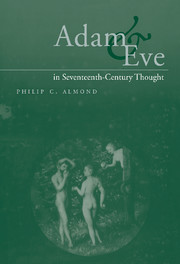Epilogue
Published online by Cambridge University Press: 18 November 2009
Summary
[Sir Hudibras] knew the seat of Paradise,
Could tell in what degree it lies;
And, as he was disposed, could prove it,
Below the moon, or else above it:
What Adam dreamt of when his bride
Came from her closet in his side:
Whether the devil tempted her
By a High-Dutch interpreter;
If either of them had a navel;
Who first made music malleable;
Whether the serpent, at the fall,
Had cloven feet, or none at all.
Samuel Butler, Hudibras, 1.173–84The publication of John Milton's Paradise Lost in 1667 marked the culmination of the elaboration of the story of Adam and Eve in the Garden of Eden. Written to ‘justifie the ways of God to men’, it represents the high point in the seventeenth century of the literary development of the Edenic myth. As James Turner correctly observes, after Paradise Lost no major literary work, or any significant work of history or psychology, began with the story of the creation and fall of Adam and Eve.
The power of the story of the Garden was beginning to wane. Some four years before Paradise Lost, Samuel Butler in Hudibras was already satirising many of those issues which, as we have seen, were so often the focus of attention – the location of Paradise, the nature of Adam's sleep, the language of the serpent and its stature.
- Type
- Chapter
- Information
- Adam and Eve in Seventeenth-Century Thought , pp. 210 - 214Publisher: Cambridge University PressPrint publication year: 1999

